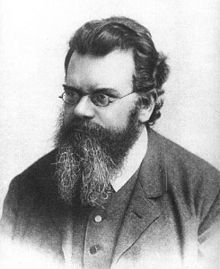
Back دماغ بولتزمان Arabic Bolsman beyni Azerbaijani Болцманов мозък Bulgarian বোল্টজম্যান মগজ Bengali/Bangla Cervell de Boltzmann Catalan Boltzmann-Gehirn German Cerbo de Boltzmann Esperanto Cerebro de Boltzmann Spanish مغز بولتسمان Persian Boltzmannin aivot Finnish

The Boltzmann brain thought experiment suggests that it might be more likely for a brain to spontaneously form in space, complete with a memory of having existed in our universe, rather than for the entire universe to come about in the manner cosmologists think it actually did. Physicists use the Boltzmann brain thought experiment as a reductio ad absurdum argument for evaluating competing scientific theories.
In contrast to brain in a vat thought experiments, which are about perception and thought, Boltzmann brains are used in cosmology to test our assumptions about thermodynamics and the development of the universe. Over a sufficiently long time, random fluctuations could cause particles to spontaneously form literally any structure of any degree of complexity, including a functioning human brain. The scenario initially involved only a single brain with false memories, but physicist Sean M. Carroll pointed out that, in a fluctuating universe, the scenario works just as well with entire bodies and entire galaxies.[1][2]
The idea is named after the physicist Ludwig Boltzmann (1844–1906), who, in 1896, published a theory that tried to account for the fact that the universe is not as chaotic as the budding field of thermodynamics seemed to predict. He offered several explanations, one of them being that the universe, even after it had progressed to its most likely spread-out and featureless state of thermal equilibrium, would spontaneously fluctuate to a more ordered (or low-entropy) state such as the universe in which we find ourselves.[3] Boltzmann brains were first proposed as a reductio ad absurdum response to this explanation by Boltzmann for the low-entropy state of our universe.[4]
The Boltzmann brain gained new relevance around 2002, when some cosmologists started to become concerned that, in many theories about the universe, human brains are vastly more likely to arise from random fluctuations; this leads to the conclusion that, statistically, humans are likely to be wrong about their memories of the past and in fact are Boltzmann brains.[5][6] When applied to more recent theories about the multiverse, Boltzmann brain arguments are part of the unsolved measure problem of cosmology.
- ^ Sean Carroll (17 June 2019). "Sean Carroll's Mindscape". preposterousuniverse.com (Podcast). Sean Carroll. Event occurs at 1:01.47. Retrieved 2 March 2019.
- ^ Sean Carroll (6 June 2022). "Sean Carroll's Mindscape". preposterousuniverse.com (Podcast). Sean Carroll. Event occurs at 1:47:20. Retrieved 7 June 2022.
- ^ Boltzmann, Ludwig (1896). "Lectures on Gas Theory" (PDF). p. 16.
- ^ Carroll, Sean (29 December 2008). "Richard Feynman on Boltzmann Brains". Retrieved 24 June 2019.
- ^ Dyson, Lisa; Kleban, Matthew; Susskind, Leonard (2002). "Disturbing Implications of a Cosmological Constant". Journal of High Energy Physics. 2002 (10): 011. arXiv:hep-th/0208013. Bibcode:2002JHEP...10..011D. doi:10.1088/1126-6708/2002/10/011. S2CID 2344440. Retrieved 21 September 2024.
- ^ Overbye, Dennis (15 January 2008). "Big Brain Theory: Have Cosmologists Lost Theirs?". New York Times. Retrieved 28 April 2022.